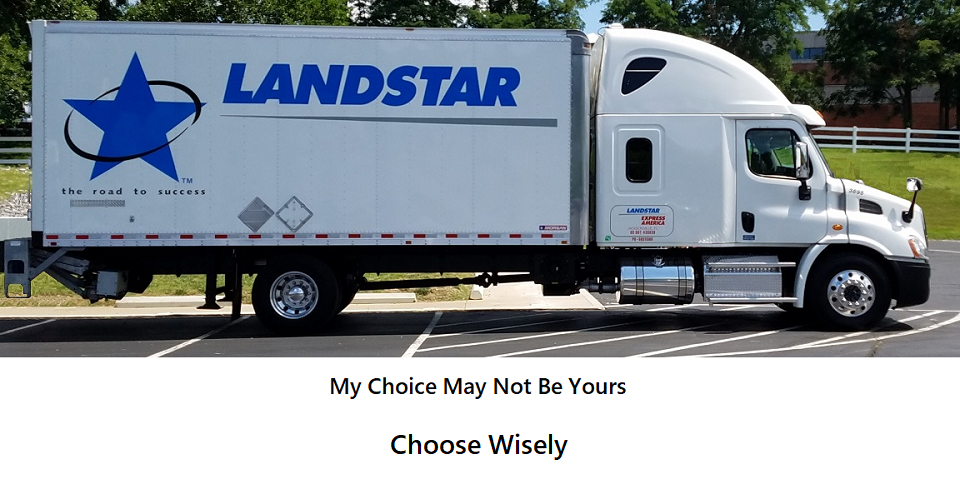Fuel for Thought

The Best Truck....For You
What is the ideal truck for you? If you ask other drivers, you are likely to get as many different opinions as the number of drivers you ask. Truth is, only you can decide which truck will best suit your expediting needs and if you do not know, how are you supposed to find out? Research, research, research. Sure asking other expediters can be part of your research, as it should be, but, it is also important to remember that if the driver who leases his or her truck on with Carrier A recommends one truck and a driver from Carrier B suggests another, how do you know who to believe? This is where your own research comes into play.
There are many types of expediting trucks on the roads today. Class 7 or Class 8? Factory sleeper or custom? Reefer or dry box? Liftgate or not? 12, 16, 18, 20, 22, 24, or 26 foot box? Single axle or tandem axle? Single axle with a tag axle or single axle with a pusher axle (Yes, those are different set ups.)? Apu or generator or neither? And these are just the tip of the iceberg for options available to expediters considering a truck purchase. How do you choose?
Start by carefully considering how your business will operate.
Class 7 or Class 8 truck? This seems to be a personal preference, but having owned both, I would say Class 8 for the durability, expected life span and heavy-dutyness. Team or solo, there potentially will be a lot of miles put on the vehicle, and a Class 8 will withstand it better and have a higher resale later compared to a Class 7.
Will you be running solo or team? Generally, teams will need/want the larger custom sleeper to accommodate more people, more gear and more comfort. A solo can get by just fine with a factory sleeper, but still may prefer the larger custom sleeper for the comfort.
Reefer or dry box? Does the carrier you are going to lease on with have enough reefer loads to justify the cost and added expense of running a reefer unit? Will a reefer unit actually be a hindrance for the customers at your selected carrier?
Liftgate? Again, it will depend on the customers you will be serving. Many warehouses have dock locks (where they lock your rear bumper to the building, to prevent drive offs while loading or unloading) and will refuse to load liftgate trucks without sufficient means of being dock locked. If your carrier regularly hauls for these types of customers, a liftgate could prevent you from hauling those loads and would also be an extra cost to you for a piece of equipment with little to no use. One last consideration for the liftgate is capacity. How much weight do you want to be able to raise and lower? Also consider the weight of the freight, pallet jack and you(and possibly your teammate in the weight capacity you choose.
What size box should you get? My guess would be that the most common are 20 and 22 foot boxes (no research was done, this is just a guess from what I have seen). There are other factors to consider than just what size you want. Generally, you want a straight truck to be 40 feet or less in total length. That larger sleeper may help dictate the box size. Don’t forget to consider this when sleeper shopping. Do you want more capacity or more comfort?
Single axle, tandem axle, single axle with pusher axle or single axle with tag axle? So let's look at where we are so far….Did you get a Class 7 or Class 8 truck? Custom sleeper with all the amenities? Liftgate? Reefer? 20 foot box? What does all that weigh? Now consider the axles all that weight rides on and it is still an empty truck at this point. If you put all of that on a single rear axle, how much freight weight can you haul?
APU, generator or neither? Today’s truck do not appreciate the long idle hours that older engines could handle. With the new emissions systems on trucks nowadays, idling will cost you much more in the long run than an APU or generator will. Choose one or the other, but not having a means of staying warm or cool, other than idling, really isn’t much of an option. An APU costs much less than a truck engine. Avoid idling as much as possible.
Last, but not least, don't forget that if you have a liftgate you will most likely need a pallet jack. What good is a liftgate if you cannot get the freight onto it.
These are just some basics to consider when buying a new truck, or even a used one. If it does not work for your business, you could be out of business.
See you down the road,
Greg
